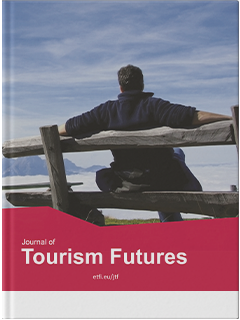再生旅游:转变思维、系统和实践
IF 5.8
Q1 HOSPITALITY, LEISURE, SPORT & TOURISM
引用次数: 12
摘要
目的本文的目的是研究旅游业向再生方法过渡所需的心态转变、系统变革和跨越边界的实践。本文试图提供具体的方法来转变思维并向再生范式过渡。设计/方法论/方法这篇观点论文定义了再生旅游,探讨了其原理和驱动旅游业转型变革的杠杆。它概述了有意识的再生旅游方法所需要的内容,并概述了再生旅游的工作原则。论文最后确定了五个关键的反思领域,这些领域试图挑战既定的思维和实践。发现旅游业的重塑需要在三个关键领域进行工作:制度变革、心态转变和实践。三个发现总结为:(1)再生旅游需要社会生态意识的转变,取决于我们将思维从“我”进化为“我们”的能力,以及发展同情心、同理心和协作行动的能力。(2) 科学的管理与向再生的过渡是不一致的。旅游业必须作为一个复杂的适应性系统进行管理,并克服与科学思维相关的个人主义、还原主义、分离和市场化的挑战。(3) 再生旅游需要一种深入参与的自下而上的方法,这种方法以地点为基础,以社区为中心,以环境为重点。原创性/价值本文分享了旅游合作实验室的思考、工作原则和建议,并基于30年的顾问、政策分析师、教育工作者、研究人员的经验,教授,现为两家旅游社会企业的创始人。凭借许多人所没有的反思的奢侈和与高等教育的距离,作者分享了她转变心态和推动变革的方法。本文章由计算机程序翻译,如有差异,请以英文原文为准。
Regenerative tourism: transforming mindsets, systems and practices
PurposeThe purpose of this paper is to examine the mindset shift, systems change and boundary spanning practices needed to transition to a regenerative approach in tourism. The paper seeks to deliver concrete ways to shift thinking and transition to a regenerative paradigm.Design/methodology/approachThis viewpoint paper defines regenerative tourism, explores its principles and the levers for driving transformational change in tourism. It outlines what a conscious approach to regenerative tourism entails and outlines working principles for regenerative tourism. The paper concludes by identifying five key areas for reflection that seek to challenge established thinking and practice.FindingsThe reinvention of tourism requires work in three key areas: systems change, mindset shift and practice. Three findings are summarised as: (1) Regenerative tourism requires a shift in social-ecological consciousness and depends on our capacity to evolve our thinking from “me” to “we” and to develop compassion, empathy and collaborative action. (2) Scientific management is inconsistent with the transition to regeneration. Tourism must be managed as a complex adaptive system and overcome the challenges of individualism, reductionism, separation and marketisation associated with scientific thinking. (3) Regenerative tourism requires a deeply engaged bottom-up approach that is place-based, community-centred and environment-focused.Originality/valueThis paper shares the reflections, working principles and recommendations of The Tourism CoLab and is based on 30 years of experience as a consultant, policy analyst, educator, researcher, professor and now as founder of two tourism social enterprises. With the luxury of reflection and the distance from higher education that many do not have, the author shares her approach to shifting mindsets and driving transformative change.
求助全文
通过发布文献求助,成功后即可免费获取论文全文。
去求助
来源期刊

Journal of Tourism Futures
HOSPITALITY, LEISURE, SPORT & TOURISM-
CiteScore
15.70
自引率
6.00%
发文量
64
审稿时长
34 weeks
期刊介绍:
 求助内容:
求助内容: 应助结果提醒方式:
应助结果提醒方式:


